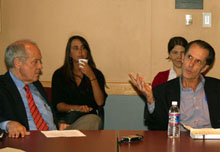Event
Shorenstein Center hosts New Orleans author Jed Horne

September 19, 2008 — While keyed to an event now three years in the past, the subject of Jed Horne’s brown-bag lunch, “Governance vs. Laissez-Faire in Rebuilding New Orleans,” couldn’t have been more timely.
“I don’t think there’s ever been a moment when the role of government and the limits of government have ever been more on the table,” said Shorenstein Center director Alex S. Jones, referring to crises that had engulfed the financial markets and the U.S. government’s unprecedented response. “I never thought that I would see a moment when the recovery that happened after Katrina would look like a drop in the bucket, but we seem to be in that state right now.”
When Katrina made landfall August 25, 2005, Jed Horne was city editor of the Times-Picayune. The paper would go on to win Pulitzer Prizes for its coverage of the storm and the devastation it wrought, and Horne continued his work afterward with his 2006 book, Breach of Faith, Hurricane Katrina and the Near Death of a Great American City.
Since the book’s publication, Horne has closely followed the city’s struggles to rebuild, and in his address to the packed room at the Belfer Center, he decried the situation in New Orleans. “Here we are, without capital infusion, without corporate support, attempting to rebuild a city.” He noted that “storms in Houston and storms in Lower Manhattan” were distracting those outside New Orleans from the city’s continuing plight. He then observed that despite “all the mantras offered by the Bush administration to market-driven recovery,” the government’s recent intervention on Wall Street revealed how little faith it truly has in markets.
Amid the challenges, Horne did see some bright spots. He lauded the work of the Broadmoor Project and other grass-roots initiatives. The storm and its aftermath also accelerated change at the Times-Picayune. “We became a community bulletin board. Blogging was new to us and people began blogging. People began reaching out … to family and scattered friends through websites that we put up there.”
Horne called New Orleans “a laboratory for our reinvention,” but one that required a concerted effort to secure the city’s geography. “Grown-up countries take these things seriously,” he noted.